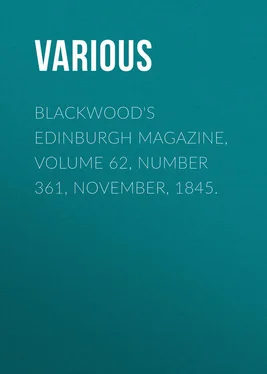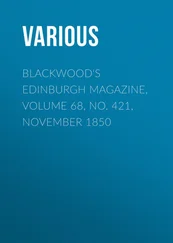Various - Blackwood's Edinburgh Magazine, Volume 62, Number 361, November, 1845.
Здесь есть возможность читать онлайн «Various - Blackwood's Edinburgh Magazine, Volume 62, Number 361, November, 1845.» — ознакомительный отрывок электронной книги совершенно бесплатно, а после прочтения отрывка купить полную версию. В некоторых случаях можно слушать аудио, скачать через торрент в формате fb2 и присутствует краткое содержание. Издательство: Иностранный паблик, Жанр: periodic, foreign_edu, Путешествия и география, на английском языке. Описание произведения, (предисловие) а так же отзывы посетителей доступны на портале библиотеки ЛибКат.
- Название:Blackwood's Edinburgh Magazine, Volume 62, Number 361, November, 1845.
- Автор:
- Издательство:Иностранный паблик
- Жанр:
- Год:неизвестен
- ISBN:нет данных
- Рейтинг книги:3 / 5. Голосов: 1
-
Избранное:Добавить в избранное
- Отзывы:
-
Ваша оценка:
- 60
- 1
- 2
- 3
- 4
- 5
Blackwood's Edinburgh Magazine, Volume 62, Number 361, November, 1845.: краткое содержание, описание и аннотация
Предлагаем к чтению аннотацию, описание, краткое содержание или предисловие (зависит от того, что написал сам автор книги «Blackwood's Edinburgh Magazine, Volume 62, Number 361, November, 1845.»). Если вы не нашли необходимую информацию о книге — напишите в комментариях, мы постараемся отыскать её.
Blackwood's Edinburgh Magazine, Volume 62, Number 361, November, 1845. — читать онлайн ознакомительный отрывок
Ниже представлен текст книги, разбитый по страницам. Система сохранения места последней прочитанной страницы, позволяет с удобством читать онлайн бесплатно книгу «Blackwood's Edinburgh Magazine, Volume 62, Number 361, November, 1845.», без необходимости каждый раз заново искать на чём Вы остановились. Поставьте закладку, и сможете в любой момент перейти на страницу, на которой закончили чтение.
Интервал:
Закладка:
Various
Blackwood's Edinburgh Magazine, Volume 62, Number 361, November, 1845
THE STUDENT OF SALAMANCA
Part I
"España de la guerra
Tremola la pendon."
It wanted about an hour of sunset on the last day of September 1833, when two young men, whose respective ages did not much exceed twenty years, emerged from a country lane upon the high-road from Tarazona to Tudela, in that small district of Navarre which lies south of the river Ebro.
The equipments of the travellers – for such the dusty state of their apparel, and the knapsacks upon their shoulders, indicated them to be – were exactly similar, and well calculated for a pedestrian journey across the steep sierras and neglected roads of Spain. They consisted, with little variation, of the national Spanish dress – short jackets of dark cloth, somewhat braided and embroidered, knee-breeches of the same material, and broad-brimmed hats, surrounded by velvet bands. Only, instead of the tight-fitting stockings and neat pumps, which should have completed the costume, long leathern gamashes extended from knee to ankle, and were met below the latter by stout high-quartered shoes. Each of the young men carried a stick in his hand, rather, as it appeared, from habit, or for purposes of defence, than as a support, and each of them had a cloak of coarse black serge folded and strapped upon his otter-skin knapsack. With their costume, however, the similarity in their appearance ceased; nothing could be more widely different than their style of person and countenance. The taller of the two, who was also apparently the elder, was of a slender, active figure, with well-moulded limbs, and a handsome, intelligent countenance, in which energy and decision of character were strongly marked. His complexion was dark olive; his eyes and short curling hair were of a coal black; what little beard he had was closely shaven, excepting upon the upper lip, which was fringed by a well-defined mustache, as gracefully curved and delicately penciled as any that Vandyke ever painted. At this time, however, there was a shade over his countenance other than that cast by the broad leaf of his sombrero; it was the look of mingled hope, anxiety, and suspense, sometimes worn by persons who are drawing near to a goal, their attainment of which is still doubtful, and at which, even when attained, it is not quite certain whether pleasure or pain awaits them.
No such thoughts or anxieties were to be read upon the joyous, careless countenance of the second traveller – a stout, square-built young man, whose ruddy complexion and light-brown hair contrasted as strongly with the dark locks and olive skin of his companion as they differed from the generally received notions of Spanish physiognomy. The face wore no particular expression, excepting that of good-humoured insouciance ; his hazel eye had a merry twinkle, and a slight fulness of lip and chin seemed to denote a reasonable degree of addiction to the good things of this life. Altogether, and to judge them by their physiognomies only, one would have chosen the first for a friend, the latter for a pleasant and jovial boon-companion.
On leaving the cross-road, the two pedestrians took a northerly direction, in which they proceeded for nearly a quarter of an hour without exchanging a syllable, the one absorbed in meditations which the other was apparently unwilling to disturb. At the end of that time they paused, as if by preconcerted arrangement, in front of a small venta , or country inn, less remarkable for the accommodation it afforded, than for its pleasant situation and aspect. It stood a little back from the road, in a nook formed by the recession of a line of wooded hills which there skirt the highway. The front of the house, composed of rough blocks of grey stone, was overgrown by the twisted branches of a venerable vine, the age of which did not prevent it from becoming covered each spring with leaves and tendrils, nor from yielding in the autumn an abundant supply of delicious gold-coloured grapes. At a short distance in front of the door, which opened into the stable, whence a wooden step-ladder led to the upper floor, there stood a huge oak, throwing its broad shadow over a table and some benches placed beneath it for the accommodation of guests. On one side of the venta, and detached from it, but in a right line with its front, was a massive fragment of wall, which had probably, at no very remote period, formed part of a chapel or convent. Its summit, which was broken and irregular, rose full thirty feet from the ground throughout more than double that length, and along the wall, at about two-thirds of a man's height, ran a horizontal black line, indicating, as did also the numerous marks and bruises upon the whitewashed surface, that this ancient piece of masonry enabled the frequenters of the venta to indulge in the favourite juego de pelota , or a game at ball, to which the Navarrese and the northern Spaniards generally are much addicted, and at which most of them excel.
On the arrival of our travellers, the benches in front of the venta had already two occupants, belonging to classes of men which may rank amongst the chief supporters of Spanish roadside inns. One of them was a corporal of dragoons, returning to his garrison at Tudela, whence he had probably been sent with a despatch, or on some similar mission. He was a strapping, powerful fellow, well set up, as the phrase goes, and whose broad shoulders and soldierly figure showed to advantage in his dark-green uniform. His horse – a high-crested, fine-legged Andalusian, whose jetty coat looked yet blacker by contrast with the white sheep-skin that covered the saddle, and the flakes of foam with which his impatient champings had covered his broad chest – was tied up near the stable door, the bridle removed, finishing out of a nose-bag a plentiful feed of maize. The dragoon's sabre and his brass and leopard-skin helmet were hanging at the saddle-bow, their owner having temporarily covered his head with a smart foraging-cap of green and scarlet cloth, which set off to great advantage his bearded and martial countenance. Having provided for his horse, the trooper was now attending to the calls of his own appetite, and doing immense execution on some goat's-milk cheese and excellent white bread, which he moistened by copious draughts of the thick black wine of Navarre.
Seated opposite to the soldier, and similarly employed, was a hardy-looking man, who had arrived in company with two mules, which were also tethered to a ring in the venta wall, but at a respectful distance from the dragoon's charger. A heap of chopped straw and Indian corn leaves was lying before them, at which they assiduously munched – not, however, without occasionally casting wistful glances at the more luxurious repast of their neighbour. The soldier and the muleteer had apparently met before; and when the new-comers approached them, they were discussing with great animation the merits of the various players in a ball-match which they had recently witnessed near Tudela. Thence they glided into a discussion concerning ball-players in general; the muleteer, who was a Navarrese, asserting the invincibility of his country at the game of pelota, whilst the corporal, who came from the neighbourhood of Oviedo, was equally confident of the superiority of the Asturians.
Whilst the younger of the travellers was ascertaining from the patrona the state of the larder, which, as is usual enough in Spanish inns, was but meagrely provided, his companion sought out the landlord of the venta, whom he found in the chimney-corner, enjoying a supplementary siesta amidst a cloud of wood smoke.
"The Conde de Villabuena," enquired the young man, when he had shaken the drowsy host out of his slumbers – "is he still at his house between this and Tudela?"
Читать дальшеИнтервал:
Закладка:
Похожие книги на «Blackwood's Edinburgh Magazine, Volume 62, Number 361, November, 1845.»
Представляем Вашему вниманию похожие книги на «Blackwood's Edinburgh Magazine, Volume 62, Number 361, November, 1845.» списком для выбора. Мы отобрали схожую по названию и смыслу литературу в надежде предоставить читателям больше вариантов отыскать новые, интересные, ещё непрочитанные произведения.
Обсуждение, отзывы о книге «Blackwood's Edinburgh Magazine, Volume 62, Number 361, November, 1845.» и просто собственные мнения читателей. Оставьте ваши комментарии, напишите, что Вы думаете о произведении, его смысле или главных героях. Укажите что конкретно понравилось, а что нет, и почему Вы так считаете.












